I Made These As A Way To Compile All The Geographical Vocabulary That I Thought Was Useful And Interesting





I made these as a way to compile all the geographical vocabulary that I thought was useful and interesting for writers. Some descriptors share categories, and some are simplified, but for the most part everything is in its proper place. Not all the words are as useable as others, and some might take tricky wording to pull off, but I hope these prove useful to all you writers out there!
(save the images to zoom in on the pics)
More Posts from Writersreferencez and Others
sometimes you need dialogue tags and don't want to use the same four


Showing 'Fear' in Writing
Eyes wide with pupils dilated.
Hands trembling uncontrollably.
Heart pounding audibly in the chest.
Backing away slowly, seeking escape.
Holding breath or breathing shallowly.
Breaking out in a cold sweat.
Startling at the slightest sound.
Whispering or speaking in a hushed tone.
Looking over their shoulder repeatedly.
Clutching at clothing or objects for reassurance.
Voice quivering or stammering.
Legs feeling weak or buckling.
Feeling a chill run down the spine.
Hugging oneself protectively.
Trying to make themselves smaller.
Furtive glances around the room.
Feeling light-headed or dizzy.
Stiffening up and freezing in place.
Swallowing hard, throat dry.
Eyes darting around, unable to focus.
Writing Fights That Are More Than Just Punches
REAL fights aren’t about the dishes in the sink. They’re about what the dishes represent. Neglect. Disrespect. One more little way you made me feel like I don’t matter.
When characters explode, make sure it’s a culmination, not a random Tuesday outburst. Sow those seeds way earlier. Every ignored text. Every moment one character flinched but didn’t speak. Let it simmer like a pot left on the stove too long — and then blow the lid off.
“You left your socks on the floor again!” Translation: You stopped caring about making me feel wanted.
╰ The “Fight Like Yourself” Principle Your shy, conflict-avoidant character isn’t going to suddenly monologue like a Shakespeare villain. They’re going to stutter. Misfire. Maybe say something stupid and instantly regret it. Your cocky, snarky character? They’ll joke until they’re cornered — and then bite. HARD.
Write fights in a way that honors your characters’ personalities even when they’re falling apart. Actually, especially when they’re falling apart.
The sarcastic one cracks a joke that lands wrong. And when the other person flinches, really flinches, the jokester looks like they just slapped themselves in the face.
╰ The "Weaponized Vulnerability" Strike Want a fight that stings? Let one character use something the other trusted them with, something private, something raw as a weapon. It’s dirty. It’s low. It feels like betrayal because it is.
“You know why nobody sticks around, right? Even your mom didn’t.” (The one thing they confessed one night, drunk and shaking. Now thrown back like a grenade.)
╰ The “No Winner, Only Wreckage” Outcome A good fight doesn’t end clean. Nobody walks away feeling like they "won." They walk away wrecked. Lonely. Furious. Guilty. Sometimes victorious in the worst possible way. If both characters don’t feel like they lost something by the end of it, time to dig deeper.
One character storms out thinking, I showed them. But on the way home, they realize their hands won’t stop shaking. And the empty seat beside them has never felt so heavy.
╰ The “Body Language Screams Louder Than Words” Method Fights aren’t just yelling. It’s clenching fists that don’t throw punches. It’s pacing like a caged animal. It’s backing into a corner you don’t even realize you’re in. Describe the tension bleeding out of their bodies.
The vein in his temple throbs. She’s standing stiff as a lamppost, arms folded so tight she might snap her own bones. The air between them buzzes with too many things left unsaid.
╰ Some Types of Fights to Play With...
The Blow-Up Over Nothing: Petty argument becomes nuclear meltdown because of all the built-up resentment.
The Long-Slow Death: Cold silences. Sharp comments. No shouting — just a slow suffocation.
The Misfire: They’re mad at someone else, but they unleash it on the wrong person. (And regret it instantly.)
The Final Straw: One wrong move, one broken promise too many, and snap — years of loyalty gone in a second.
A good fight scene shouldn’t just bruise skin. It should bruise souls.
Make your characters shatter themselves a little bit. Make the reader beg them to fix it and wonder if they ever truly can.
sometimes you need dialogue tags and don't want to use the same four


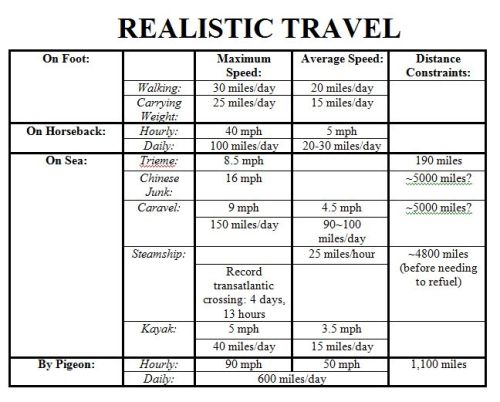
Here’s an invaluable writing resource for you.
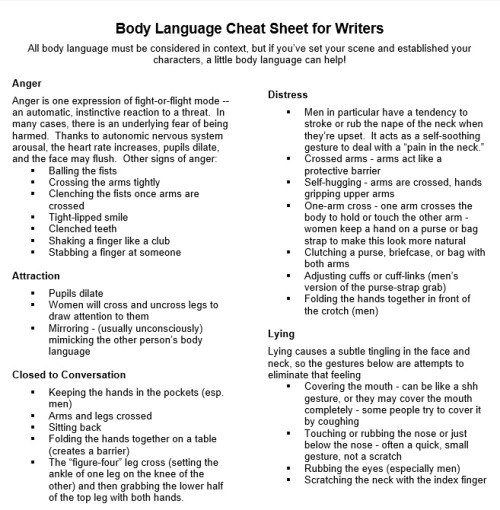

Body Language Cheat Sheet for Writers
As described by Selnick’s article:
Author and doctor of clinical psychology Carolyn Kaufman has released a one-page body language cheat sheet of psychological “tells” (PDF link) fiction writers can use to dress their characters.
site that you can type in the definition of a word and get the word
site for when you can only remember part of a word/its definition
site that gives you words that rhyme with a word
site that gives you synonyms and antonyms
PLEASE, PLEASE STOP SCROLLING.
BOOST, BOOST, BOOST! Especially if you don’t live in the U.S., because that’s all you can do to help us.
If you DO live here, this post has 5 things you can do; feel free to skip to the bullet points.
I’m sure you’re sick of seeing this, but we are in the final stages of the Net Neutrality repeal. I know long posts about this can be overwhelming, so at least just pick a bullet point and do it! HOPE IS NOT LOST YET.
WE STILL HAVE ONE LAST CHANCE — Until April 27th
There’s a CRA (Congressional Review Act) vote to get Net Neutrality back, and it may still win. THIS IS BECAUSE OF US!!! Enough people in congress listened to our calls, emails, and tweets, so a CRA has been called for to try and stop Ajit Pai.
Long posts about this can be overwhelming, so I’ll keep it simple and just list some quick and easy options below for how you can help save it. WE’VE ALREADY MADE PROGRESS, KEEP GOING! WE’RE SO CLOSE! I’m lucky enough to have the ability to do these, so I’m doing all of them, even though it’s hard for me. Do it for the people who can’t. Do it for those who will LOSE THEIR JOBS or their educations or their friends or their support. Do it for the kids too young to use a phone. Do it for the families who might be put out of homes. Do it for everyone.
WE NEED ONE MORE SENATE VOTE. DO AT LEAST ONE OF THESE 5 THINGS IF YOU’RE PHYSICALLY CAPABLE
[Info and Resources for Action]
FIRST OFF, if you don’t know what to say, here are some basic templates as well as my own that have had an effect in the past.
For your Senator’s contact info (phone/email/twitter/etc): http://act.commoncause.org/site/PageServer?pagename=sunlight_advocacy_list_page
[Action to Take]
KEY: bold = most important, *** = quickest/easiest to do
Here you can write anything and they’ll email it around: https://www.battleforthenet.com/
*** OR just scroll down and click a Senator to tweet them.
*** Just type your zip code here, and it’ll email/tweet your Senators! https://www.publicknowledge.org/act-now/tell-congress-to-use-the-cra-to-save-net-neutrality/#anchor
Text RESIST to 50409 (reply Senate, then copy any of the templates or write your own) — it’ll automatically email/fax it
*** Reblog, Retweet, and tell people as much as possible! But that alone isn’t enough. Get your friends/family/classmates to do these, too!!!
If you can do this last one, if you’re at all able, do it.
Call the Capitol at 202-224-3121. Just say where you’re from and they’ll transfer you to your senator’s office. Here’s a template for what to say:
“Hello, I’m [name], and I’m a constituent of Senator [name]. I’m calling to urge them to vote in support of net neutrality, as it is very important to the general public. I am watching their actions on net neutrality, and it will influence my vote in coming years. Thank you!”
(This also works as a great template for tweets/emails to your Senators)
Side Note: You can go here to see how many calls each of your Sen/Reps have already received: https://www.battleforthenet.com/scoreboard/ – it’s cool to see that a lot of calls CAN AND HAVE change(d) the vote!
THIS IS 2018 — WE CAN VOTE THEM OUT THIS YEAR AND THEY KNOW IT. USE THAT LEVERAGE.
Some of my favorite words and phrases to describe a character in pain
coiling (up in a ball, in on themselves, against something, etc)
panting (there’s a slew of adjectives you can put after this, my favorites are shakily, weakly, etc)
keeling over (synonyms are words like collapsing, which is equally as good but overused in media)
trembling/shivering (additional adjectives could be violently, uncontrollably, etc)
sobbing (weeping is a synonym but i’ve never liked that word. also love using sob by itself, as a noun, like “he let out a quiet sob”)
whimpering (love hitting the wips with this word when a character is weak, especially when the pain is subsiding. also love using it for nightmares/attacks and things like that)
clinging (to someone or something, maybe even to themselves or their own clothes)
writhing/thrashing (maybe someone’s holding them down, or maybe they’re in bed alone)
crying (not actual tears. cry as in a shrill, sudden shout)
dazed (usually after the pain has subsided, or when adrenaline is still flowing)
wincing (probably overused but i love this word. synonym could be grimacing)
doubling-over (kinda close to keeling over but they don’t actually hit the ground, just kinda fold in on themselves)
heaving (i like to use it for describing the way someone’s breathing, ex. “heaving breaths” but can also be used for the nasty stuff like dry heaving or vomiting)
gasping/sucking/drawing in a breath (or any other words and phrases that mean a sharp intake of breath, that shite is gold)
murmuring/muttering/whispering (or other quiet forms of speaking after enduring intense pain)
hiccuping/spluttering/sniffling (words that generally imply crying without saying crying. the word crying is used so much it kinda loses its appeal, that’s why i like to mix other words like these in)
stuttering (or other general terms that show an impaired ability to speak — when someone’s in intense pain, it gets hard to talk)
staggering/stumbling (there is a difference between pain that makes you not want to stand, and pain that makes it impossible to stand. explore that!)
recoiling/shrinking away (from either the threat or someone trying to help)
pleading/begging (again, to the threat, someone trying to help, or just begging the pain to stop)
Feel free to add your favorites or most used in the comments/reblogs!
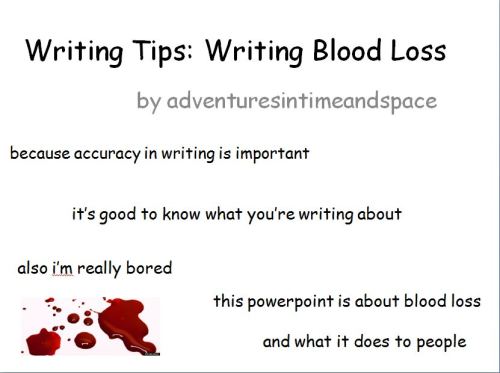
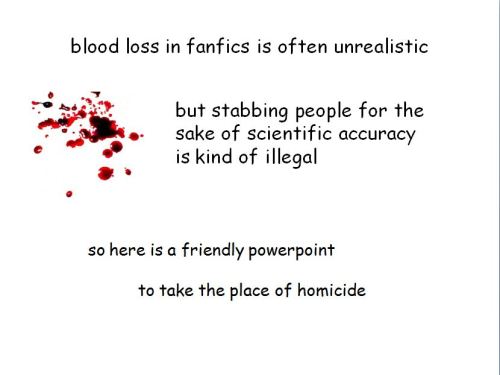

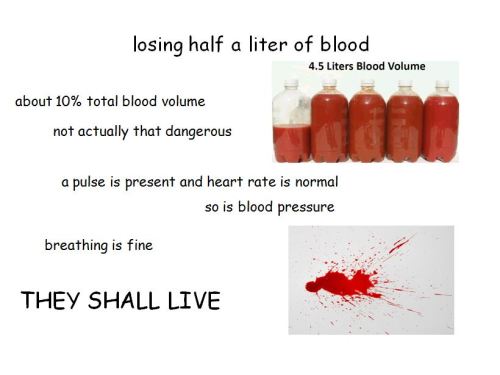
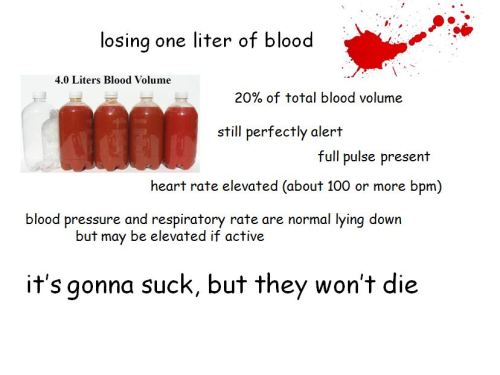
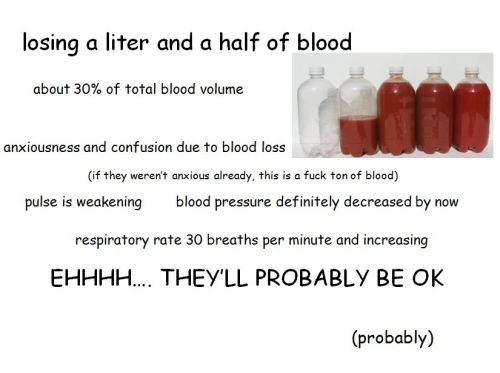



Here are some scientific facts about blood loss for all you psychopaths writers out there.
-
 crystalxxwillpower reblogged this · 3 days ago
crystalxxwillpower reblogged this · 3 days ago -
 hashinanaho liked this · 3 days ago
hashinanaho liked this · 3 days ago -
 dandyworldactors liked this · 3 days ago
dandyworldactors liked this · 3 days ago -
 dagdasgoddess reblogged this · 3 days ago
dagdasgoddess reblogged this · 3 days ago -
 dagdasgoddess liked this · 3 days ago
dagdasgoddess liked this · 3 days ago -
 tai-suits reblogged this · 3 days ago
tai-suits reblogged this · 3 days ago -
 taichikitty reblogged this · 3 days ago
taichikitty reblogged this · 3 days ago -
 corphneux707 liked this · 3 days ago
corphneux707 liked this · 3 days ago -
 trunk-in-the-attic reblogged this · 3 days ago
trunk-in-the-attic reblogged this · 3 days ago -
 captainfiri liked this · 3 days ago
captainfiri liked this · 3 days ago -
 binarysunsetboy reblogged this · 4 days ago
binarysunsetboy reblogged this · 4 days ago -
 long-termpact liked this · 4 days ago
long-termpact liked this · 4 days ago -
 thinthle liked this · 4 days ago
thinthle liked this · 4 days ago -
 ano-malie reblogged this · 4 days ago
ano-malie reblogged this · 4 days ago -
 starrrelic reblogged this · 4 days ago
starrrelic reblogged this · 4 days ago -
 glitchyypants reblogged this · 4 days ago
glitchyypants reblogged this · 4 days ago -
 835pm liked this · 4 days ago
835pm liked this · 4 days ago -
 smtiv liked this · 4 days ago
smtiv liked this · 4 days ago -
 crownconstellation liked this · 4 days ago
crownconstellation liked this · 4 days ago -
 megaxard reblogged this · 4 days ago
megaxard reblogged this · 4 days ago -
 deathbyspade liked this · 4 days ago
deathbyspade liked this · 4 days ago -
 lunaticdreams liked this · 4 days ago
lunaticdreams liked this · 4 days ago -
 mizumech liked this · 4 days ago
mizumech liked this · 4 days ago -
 punysaur reblogged this · 4 days ago
punysaur reblogged this · 4 days ago -
 thevaultt reblogged this · 5 days ago
thevaultt reblogged this · 5 days ago -
 alittle-annihilation reblogged this · 5 days ago
alittle-annihilation reblogged this · 5 days ago -
 triple-edged-sword liked this · 5 days ago
triple-edged-sword liked this · 5 days ago -
 sugarwood liked this · 5 days ago
sugarwood liked this · 5 days ago -
 sixtoads reblogged this · 5 days ago
sixtoads reblogged this · 5 days ago -
 crawlthesky reblogged this · 5 days ago
crawlthesky reblogged this · 5 days ago -
 the-trashman-cometh reblogged this · 5 days ago
the-trashman-cometh reblogged this · 5 days ago -
 jjraptorcat liked this · 5 days ago
jjraptorcat liked this · 5 days ago -
 butter-king55 liked this · 5 days ago
butter-king55 liked this · 5 days ago -
 butter-king55 reblogged this · 5 days ago
butter-king55 reblogged this · 5 days ago -
 maliciously-delicious reblogged this · 6 days ago
maliciously-delicious reblogged this · 6 days ago -
 maliciously-delicious liked this · 6 days ago
maliciously-delicious liked this · 6 days ago -
 samueljsanders liked this · 6 days ago
samueljsanders liked this · 6 days ago -
 i-am-sith-not-jedi liked this · 6 days ago
i-am-sith-not-jedi liked this · 6 days ago -
 sqrzos-creationtips reblogged this · 6 days ago
sqrzos-creationtips reblogged this · 6 days ago -
 sqrzos liked this · 6 days ago
sqrzos liked this · 6 days ago -
 bornt-urnge reblogged this · 6 days ago
bornt-urnge reblogged this · 6 days ago -
 perpetuallyangerygoatmom reblogged this · 6 days ago
perpetuallyangerygoatmom reblogged this · 6 days ago -
 rodrickheffley liked this · 6 days ago
rodrickheffley liked this · 6 days ago -
 m-ellygray liked this · 6 days ago
m-ellygray liked this · 6 days ago -
 eternityengine reblogged this · 6 days ago
eternityengine reblogged this · 6 days ago -
 endminx reblogged this · 6 days ago
endminx reblogged this · 6 days ago